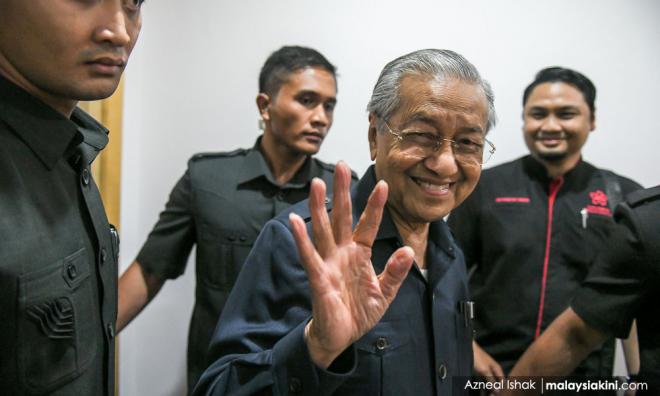
For some time now, Prime Minister Dr Mahathir Mohamad has left a trail of doubt about whether his fastenings to reality have come loose.
He is 94 years going on 95 in a few months. That's an age when one's grip might understandably be slipping.
Ordinarily, this is something that ought not to be surprised except that Mahathir is not in any mood to lay down the burdens of prime ministerial office.
He has said he will step aside, that he can't go on forever.
But on being asked when that might be, he tends to reply in the fashion of the station master who, when asked when the train would arrive, said: “That depends.”
Pressed on what does it depend, the station master was equally ambivalent: “That also depends.”
Only yesterday this attenuation from reality could be seen from the prime minister's comments to international news agency Reuters on the subject of the defeat the coalition he leads suffered in last Saturday's Kimanis parliamentary by-election.
The comments were astounding coming from one who is head honcho of Pakatan Harapan. It renewed doubts that Mahathir is not all there.
“We have lost five by-elections but they still don’t understand,” Reuters reported Mahathir as telling reporters in Langkawi on Sunday, the day after Harapan's fifth straight by-election defeat.
“I told them in a democracy you need strong support from the people. But instead, they fight amongst themselves and divide the people… They are not going to win unless they change their ways,” he said.
On a number of levels, these comments are startling and disingenuous.
Firstly, who is “they” that Dr M is referring to. If “they” is Harapan, is he not part of them?
Also, in a democracy, you need majority support to win power, but you may not have majority support to implement reforms long sought after and, more importantly, publicised in a manifesto on which a campaign has been fought and won, as was the case with Harapan.
By their very nature, reforms entail changes that will be opposed by sections of the polity, especially those who benefit from the status quo.
But reforms, if progressive, would over time gain support when the benefits they bring are seen to outweigh the downsides.
Hence, one needs courage and cogency, not to mention some guile and a little panache, to go ahead and implement reforms in the face of overt and, even, covert opposition.
Mahathir has been singularly lacking in the will and enthusiasm to implement reforms in the educational and judicial spheres.
He seems not to want to lead but to follow the pack. Sensing the irresolution, opponents are emboldened to thwart him.
More astounding than Mahathir's reasons for his coalition's fifth straight by-election defeat were his remarks on the supposed fractiousness of Harapan component parties and its allegedly divisive effects on the people.
For a leader who was the central figure in the controversial Malay Dignity Congress of last September, where racially charged remarks were made, including some by Mahathir himself, his comments on the strife in Harapan components and their supposedly damaging effects on public support for the coalition are disingenuous.
His remarks on the Chinese education movement and rights to citizenship of the non-Malays helped stoke the fires of public contention on these issues.
They identify him as a partisan in the febrile debate that usually marks public discourse on these issues.
From his rhetoric, one does not recognise Mahathir as the leader of a political movement (Harapan) that seeks to be inclusive and egalitarian.
Similarly, his stance vis-a-vis the turbulence in Harapan's largest component PKR – the only party in the coalition that can be regarded as fractious – is more manipulative than calming.
Mahathir's suggestion to Reuters that Harapan could wind up being a one-term government and he implicitly faulting the coalition's components for this possibility ignores his hand in the looming fiasco.
His subsequent distancing himself from the comment and shifting to the news agency the onus for it only underscores the point about the premier's loosening grasp.
Finally, the malaise besetting Harapan is not helped by the presence of PKR's wobbly supremo Anwar Ibrahim as Mahathir's heir apparent.
The direness of Harapan's situation is not just being saddled with a PM who seems to be losing it and wants to stay on, but also by having as heir apparent a leader who cannot be made PM of a Muslim majority nation.
Why this is so would be the subject of another article on the fraught state of Harapan's situation in the wake of its fifth straight by-election defeat.
TERENCE NETTO has been a journalist for more than four decades. - Mkini


No comments:
Post a Comment
Note: Only a member of this blog may post a comment.